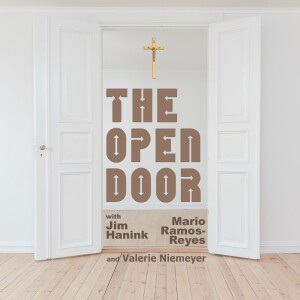
Episode 231: Dr. Michael J. Healy, Sr., Discusses the Philosophy of John Paul II (March 16, 2022)
 2022-03-16
2022-03-16
Download
Right click and do "save link as"
In this episode of The Open Door, panelists Jim Hanink, Mario Ramos-Reyes, and Christopher Zehnder explore the philosophical and artistic legacy of St. John Paul II. Our welcome guest is Dr. Michael J. Healy. He recently authored A Primer in the Philosophy of John Paul II—In His Own Words (En Route Books and Media, 2021). Healy has served as Dean of the Faculty at Franciscan University of Steubenville and interim president of Ave Maria College. As a full professor of philosophy at Franciscan University, he specializes in philosophy of the person, ethics, existentialism, and philosophy of religion. He has a special love for Kierkegaard, von Hildebrand, and Wojtyla interpreted in light of the philosophia perennis. We’ll be asking Dr. Healy the following questions. Feel free to suggest your own.
Dr. Healy, Michael if we may, could you tell us a bit about yourself and how you came to Franciscan University?
You wrote your book with your students in mind. How would you describe the academic dimension of your school?
In your Primer you point out the distinctly Polish framework of St. John Paul II. Could you explain that framework?
Ukraine, like Poland, is at the intersection of West and East. Both are Slavic countries. How did John Paul II understand the Slavic heritage?
What is the context for John Paul II work as a dramatist? How does he present the primacy, as it were, of the word?
What is Thomistic Personalism? Who are some of its contemporary proponents?
In light of what we might call the turn to the subject, what is the difference between subjectivity and subjectivism?
How does Carmelite spirituality affect John Paul II’s theological writing?
Are there any distinctive intellectual links between Dietrich von Hildebrand and John Paul II?
What’s your next project?
For more on Dr. Healy's work on the philosophy of John Paul II, see https://enroutebooksandmedia.com/primer/
Dr. Healy's book seeks to aid students in comprehending the Holy Father’s thought, Dr. Healy provides close-to-the-text summary interpretations of Saint John Paul II’s major philosophical works, condensing the essence of his philosophical teachings on the person and act, love, and sexuality.
view more
Dr. Healy, Michael if we may, could you tell us a bit about yourself and how you came to Franciscan University?
You wrote your book with your students in mind. How would you describe the academic dimension of your school?
In your Primer you point out the distinctly Polish framework of St. John Paul II. Could you explain that framework?
Ukraine, like Poland, is at the intersection of West and East. Both are Slavic countries. How did John Paul II understand the Slavic heritage?
What is the context for John Paul II work as a dramatist? How does he present the primacy, as it were, of the word?
What is Thomistic Personalism? Who are some of its contemporary proponents?
In light of what we might call the turn to the subject, what is the difference between subjectivity and subjectivism?
How does Carmelite spirituality affect John Paul II’s theological writing?
Are there any distinctive intellectual links between Dietrich von Hildebrand and John Paul II?
What’s your next project?
For more on Dr. Healy's work on the philosophy of John Paul II, see https://enroutebooksandmedia.com/primer/
Dr. Healy's book seeks to aid students in comprehending the Holy Father’s thought, Dr. Healy provides close-to-the-text summary interpretations of Saint John Paul II’s major philosophical works, condensing the essence of his philosophical teachings on the person and act, love, and sexuality.
More Episodes
012345678910111213141516171819
Create your
podcast in
minutes
- Full-featured podcast site
- Unlimited storage and bandwidth
- Comprehensive podcast stats
- Distribute to Apple Podcasts, Spotify, and more
- Make money with your podcast
It is Free
- Privacy Policy
- Cookie Policy
- Terms of Use
- Consent Preferences
- Copyright © 2015-2024 Podbean.com





